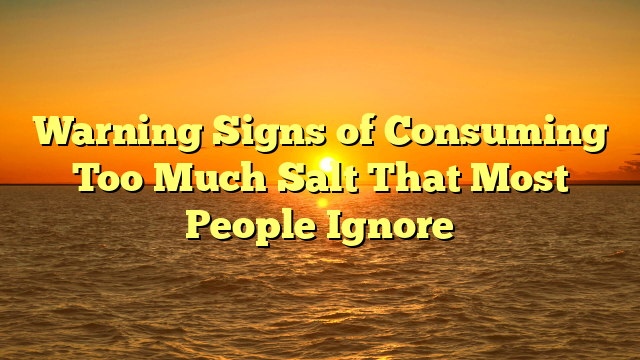The majority of us use salt to spice up our food. Table salt is consisted of 60 % chloride and 40 % sodium. That means that every teaspoon of salt contains around 2,000 milligrams of sodium.
The recommended amount of sodium per day is nothing but 2,300 milligrams. Nevertheless, people consume twice the recommended amount. Ingesting excess amounts of salt can cause long-term health issues.
Excess salt can lead to long-term health effects.
You need to pay close attention the warning signs of salt over consumption, as diets that are high in salt have noticeable short-term and long-term problems.
Warning Signs of Consuming too Much Salt
- Excessive Thirst
Sodium makes you thirsty because too much of it disrupts the balance of fluid in your cells. As our salt intake increases, our bodies pull the water out of our cells into the bloodstream. In this process our brain gets triggered that we need water and make you crave water.
- Bloating
The bloated feeling you get after consuming excess sodium is a result of fluid buildup, which makes you feel uncomfortable and increases your blood volume, causing your heart to work harder.
- Edema
Excess salt consumption is one of the top 10 reasons for swollen ankles legs and feet.
When excessive salt makes the levels of sodium increase, your body retains water. As extra fluids build up in tissues, the symptom that appears is swelling. This swelling, called edema, affects various parts of the body, but often occurs in the face, hands, legs, ankles and feet. One of the 6 tricks for shedding water weight is to reduce the consumption of salt.
- Cravings
Take note of cravings for salty foods as this can be a warning sign to excess consumption of salt. Becoming fond of salty foods can lead to other foods tasting bland. These cravings might be the indication that there is too much salt in your diet.
- High Blood Pressure
Salt works on your kidneys to make your body hold on to more water. This extra stored water raises your blood pressure and puts strain on your kidneys, arteries, heart and brain. The extra blood pressure caused by eating too much salt puts extra strain on the insides of your arteries.
To cope with the extra strain, the tiny muscles in the artery walls become stronger and thicker. Yet this only makes the space inside the arteries smaller and raises your blood pressure even higher.
Long Term Effects of Excess Salt Consumption
- Osteoporosis
Diet and digestion play an essential role in preventing and healing osteoporosis.
Excess salt increases calcium loss in the urine, where some of it is taken from the bones. Urine flushing out the excess calcium has been linked to osteoporosis due to bone thinning. 3
- Kidney Stones
The kidneys are in charge of retaining water and get rid of water. High salt intake can hinder this process due to less water being removed by the body. Kidney stones are caused by urinary calcium. Urinary calcium is increased with high salt intake.
Consumption of too much sodium is also one of the 15 common habits that can damage your kidneys.
- Stomach Cancer
Heavily salted and proceeded food may increase the risk of stomach cancer and it’s also one of top 5 cancer causing foods to avoid.
This may explain why there is such a high rate of stomach cancer in Japan, where salty, pickled foods are popular. An epidemiological study published in June 2010 in the American Journal of Clinical Nutrition found that a diet high in salt can increase in 10% the risk of stomach cancer.
According to a research published in Infect Immun. 2013, High concentrations of salt in the stomach appear to induce gene activity in the ulcer-causing bacterium Helicobacter pylori, making it more virulent and increasing the likelihood of an infected person developing a severe gastric disease and even cancer.
Tips for Reducing Your Salt Intake
- Stay away from processed food
Around 75 % of the salt we consume comes from food we eat in restaurants and processed food. One should eat fresh products in order to decrease salt intake.
- Check out the sodium content
When you buy food you need to pay attention to the sodium amount, since some products might appear to be healthy but are loaded with sodium in reality.
- Consider different seasonings
You can spice up your food with lemon or lime juice, spray balsamic or maybe wine vinegars. There are various options.
- Substitute table salt with natural salt
Table salt and natural salt are too different things. Natural salt is highly refined and is 97% pure sodium chloride, and added chemicals like anti-caking agents and absorbents.
- Don’t avoid salt completely
You should consume salt in moderation, since depriving the body of the mineral can leave it in a worse state than consuming a little too much.
Source: healthyandnaturalworld.com
